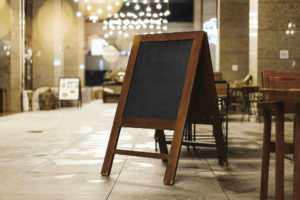Dublin’s Sandwich Board tax “excessive”

Legislation is already in place to allow Dublin City Council to remove sandwich boards that are unlicensed.
Section 254 of the Planning & Development Act 2000 provides for A-Boards on the public road or footpath in Dublin and the Council notes that certain streets are unsuitable for the placement of advertising boards due to restricted widths, high pedestrian footfall etc. This would include Grafton Street and O’Connell Street.
The council hired four additional inspectors this year to carry out increased enforcement of its street regulations but the hospitality trade is far from happy.
“This is a shockingly excessive decision by Dublin City Council and has come without any consultation with businesses,” said the Restaurants Association of Ireland’s Chief Executive Adrian Cummins, “While the Restaurants Association welcomes the regulation of street furniture, this move will disproportionately affect small businesses who cannot afford a fee of this size. The proposal is clearly a money-grabbing exercise, building on the Dublin City Council’s sunshine-tax on outdoor tables and chairs.”
He pointed out that Dublin City Council is already collecting more than €600,000 a year in a “sunshine tax” on outdoor tables and chairs in restaurants in Dublin city.
Dublin City Council collected €614,074.82 in 2018 for this with charges for previous years being:
* 2017: €547,031.47
* 2016: €518,383.91
* 2015: €515,188.64
* 2014: €451,619.10
Legislation is already in place to allow Dublin City Council to remove sandwich boards that are unlicensed.
There was no consultation with the Licensed Vintners Association or other business associations on this issue, points out LVA Chief Executive Donall O’Keeffe who told Drinks Industry Ireland, “There has to be a balance struck between accessibility on streets and the needs of business. We believe the proposed charges are excessive and disproportionate”.
Richard Guiney, Chief Executive of Dublin Town said the cost of doing business in Dublin is already high.
“The major issue for outdoor seating table and chairs is that Dublin City Council charge both for the use of a licensed area and the placing of tables and chairs within that area while other jurisdictions charge for either one or the other,” he told Drinks Industry Ireland, “This makes Dublin automatically more expensive.
“Also, Dublin has a very expensive and bureaucratic application process which generally necessitates the engagement of an architect to produce scaled drawings.
“There’s also a need to place an advertisement in a national newspaper which in today’s world seems archaic. All told, it means that the cost for a typical Dublin business quickly comes out at four to five times what one would expect to pay in our competitor cities.”








